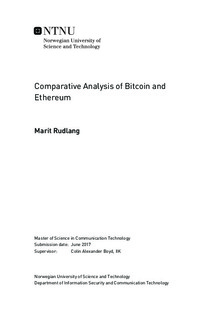Comparative Analysis of Bitcoin and Ethereum
Master thesis
Permanent lenke
http://hdl.handle.net/11250/2451325Utgivelsesdato
2017Metadata
Vis full innførselSamlinger
Sammendrag
Since Bitcoin was launched in 2009, several new cryptocurrencies have been initiated with variations to Bitcoin's original design. Although Bitcoin still remains the most prominent actor in the market, some technical problems have been raised to the design of the protocol. The objective of this thesis is to determine whether the newer cryptocurrencies handle the technical problems of Bitcoin, or if they also suffer from the same issues. Instead of evaluating several cryptocurrencies for this comparison, the cryptocurrency Ethereum has been chosen as a proxy for the others. Ethereum was started in 2014, is widely backed in the community and is second in line to Bitcoin when it comes to market capitalization.
As a basis for the comparative analysis a rigorous study of the Bitcoin and Ethereum protocols have been performed, and parallel descriptions of the systems have been devised. Three technical problem have shaped the focus of the analysis: computational waste, concentration of power and ambiguity of transactions. Real world statistical data has been gathered and synthesized to enlighten the findings in the comparison. The main result of the comparison is that both systems suffer from the same problems to a certain degree, due to the fact that they utilize the same consensus mechanism. However, Ethereum utilizes several newer techniques to try and reduce the severity of these problems compared to Bitcoin, with varying degrees of success.
